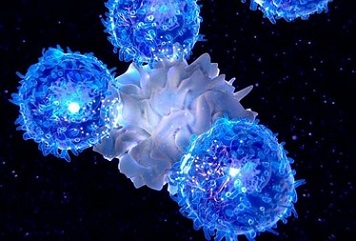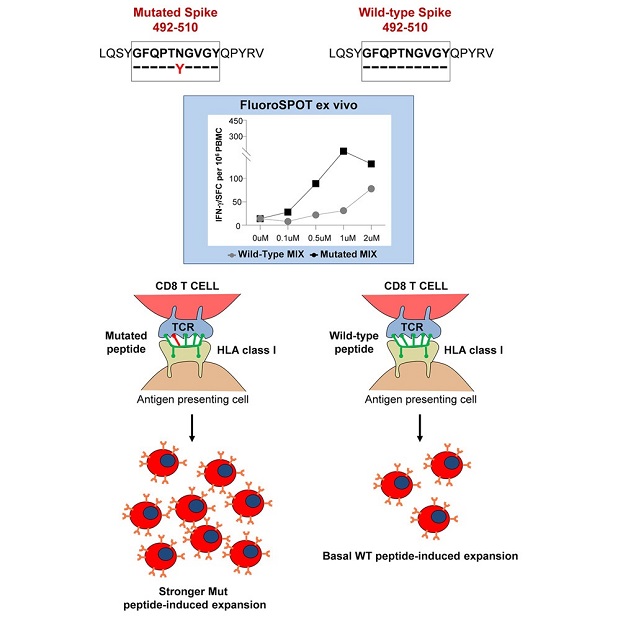Italian Study Surprisingly Finds That SARS-CoV-2 Mutations Can Generate Natural Heteroclitic-Like Peptides That Enhance CD8 T-Cell Response!
COVID-19 News - SARS-CoV-2 Mutations Can Generate Natural Heteroclitic-Like Peptides May 28, 2023 1 year, 10 months, 3 weeks, 4 days, 1 hour, 7 minutes ago
COVID-19 News: In a new study led by researchers from the University of Parma-Italy and Ospedaliero-Universitaria di Parma-Italy along with scientists from Vir Biotechnology in San Francisco, a remarkable finding has emerged about the impact of SARS-CoV-2 mutations on our immune system. While the virus continues to mutate, evading our humoral immunity, the study suggests that these mutations might actually have a positive effect on our CD8 T-cell responses. This unexpected discovery sheds light on the complex interplay between the virus's evolution, antibody evasion, and the potential for enhanced antiviral protection.
 The Rapid Evolution of SARS-CoV-2
The Rapid Evolution of SARS-CoV-2
As an RNA virus, SARS-CoV-2 is known for its rapid mutation rate, which allows it to accumulate genetic variations more quickly than DNA-based pathogens. This high mutability contributes to the emergence of different variants, including the notorious Variants of Concern (VoC) and Variants of Interest (VoI). These variants exhibit increased transmissibility and, in some cases, resistance to vaccines and antiviral treatments as what we are currently witnessing in the case of the newly emerging XBB sub-lineages that have been detailed in various studies and
COVID-19 News reports. Understanding the effect of these mutations on our immune responses is crucial for developing more effective vaccines and therapies.
Role of CD8 T Cells
While virus-neutralizing antibodies play a crucial role in preventing infection, CD8 T cells are responsible for eliminating virus-infected cells and curbing the progression of severe disease. What makes CD8 T cells particularly interesting is their apparent resistance to mutational inactivation compared to humoral immunity. CD8 T cells recognize and destroy virus-infected cells, thus limiting the spread of infection within the host. This study aimed to investigate the relationship between SARS-CoV-2 mutations and CD8 T-cell responses.
The Discovery of Heteroclitic-Like Peptides
Through a comprehensive analysis of 30 spike variant peptides containing the most significant mutations from various SARS-CoV-2 variants, the study made an astonishing discovery. Mutated epitopes, which are fragments of viral proteins recognized by CD8 T cells, not only neutralize or inhibit CD8 T-cell recognition but can also enhance or generate entirely new CD8 T-cell responses. These mutated peptides, called heteroclitic-like peptides, seem to emerge as a result of the virus's evolution, driven by antibody evasion and increased transmissibility.
Implications for Antiviral Protection and Vaccines
The functional enhancing effect of these heteroclitic-like peptides holds immense promise for the development of more potent COVID-19 vaccines. While artificially created heteroclitic peptides have been explored in the past to improve T-cell-based vaccines, this study demonstrates the natural generation of such peptides by SARS-CoV-2 mutations. By selecting these peptides, individuals with weaker CD8 T-cell responses may benefit from improved antiviral protection.
Looking Ahead: Harnessing the Power of C
D8 T Cells
This groundbreaking research challenges the conventional understanding of SARS-CoV-2 mutations' impact on our immune system. While virus mutations can evade humoral immunity, they might inadvertently enhance CD8 T-cell responses, thus offering a broader and more robust protection against COVID-19.
Harnessing the power of CD8 T cells could be a key strategy in the development of future antiviral therapies and vaccines. Further research is needed to fully understand the implications of these findings and explore their potential for clinical applications
Conclusions
This study opens up new possibilities for combating SARS-CoV-2 and other viral infections. By unveiling the unexpected positive impact of mutations on CD8 T-cell responses, we may be one step closer to developing more effective vaccines and therapies to tackle the ongoing COVID-19 pandemic and future viral outbreaks.
The study findings suggest that a deeper understanding of the intricate relationship between viral evolution and immune responses is crucial in our fight against infectious diseases.
 Graphical Abstract
Graphical Abstract
The discovery of natural heteroclitic-like peptides, which enhance CD8 T-cell responses, provides valuable insights into the design of next-generation vaccines. By incorporating these mutated epitopes into vaccine formulations, scientists may be able to stimulate a more robust and durable immune response. This could potentially improve vaccine efficacy, especially in individuals with weaker immune systems or those who have received previous vaccinations.
Moreover, the study highlights the importance of CD8 T cells in controlling viral infections. While much attention has been focused on antibodies, which are the primary target of current vaccines, CD8 T cells play a crucial role in eliminating virus-infected cells. By harnessing the power of CD8 T cells, future therapies could be designed to enhance their activity and effectiveness in combating viral infections.
The study findings were published in the peer reviewed journal: iScience.
https://www.cell.com/iscience/fulltext/S2589-0042(23)01017-9
Additional Information As To What Natural Heteroclitic-Like Peptides Are.
Natural heteroclitic-like peptides are a class of peptides that possess the ability to stimulate immune responses against related but distinct antigens. The term "heteroclitic" refers to a modification or alteration of a peptide sequence that enhances its immunogenicity or changes its binding specificity.
Typically, in the context of immunology, heteroclitic peptides are modified versions of original peptides that bind to major histocompatibility complex (MHC) molecules and are recognized by T cells. These modified peptides can exhibit enhanced or altered binding to MHC molecules, leading to a different immune response compared to the original peptide.
These natural heteroclitic-like peptides are derived from naturally occurring proteins or antigens. They can arise through various mechanisms, including post-translational modifications, genetic variations, or proteolytic processing. These modifications can result in changes to the peptide sequence, leading to altered binding to MHC molecules and subsequent activation of different T cell populations.
Importantly, the discovery and characterization of natural heteroclitic-like peptides have significant implications in understanding immune responses and developing immunotherapeutic strategies.
By identifying these peptides and their immunogenic properties, researchers can potentially design novel vaccines, cancer immunotherapies, or other interventions to enhance immune recognition and response against specific antigens.
It should be noted that the term "heteroclitic" has been primarily used in the context of peptide modifications for immunological studies. The term "heteroclitic-like" is sometimes used to describe similar phenomena observed with other types of antigens, such as proteins or non-peptidic molecules, where modifications or structural changes result in altered immune recognition.
For the latest
COVID-19 News, keep on logging to Thailand Medical News.

